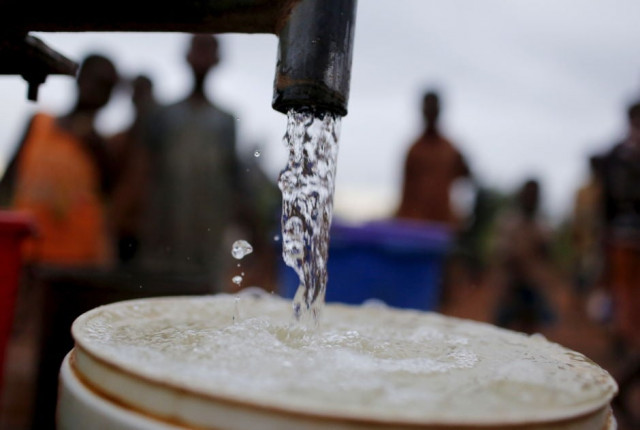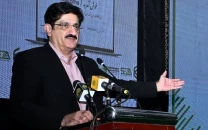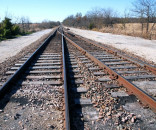Karachi’s water crisis remains unmeasured
‘Megacity suffers from a deficit of 135 MGD, receives a total of 65 MGD of water’

A representational image. PHOTO: REUTERS
Although, common wisdom suggests that at present Karachi draws most of its water from the Keenjhar Lake, the exact amount according to the water board can only be determined upon halting the development project for the additional 65 MGD of. Following which, a more appropriate plan can be drafted for the distribution of water to the Karachi. But where certain estimates suggest that the megacity currently suffers from a deficit of over 135 MGD of water, a more accurate estimation will only be available after National Engineering Service Pakistan (NESPAK)’s assessment of the issue.
According to a KWSB official who spoke to The Express Tribune on conditions of anonymity, the 65 MGD plan, which is thought to be one of the most significant mega projects, has already been hit with several delays in the past. “Things like incompetence of engineers, non-approval of revised PC-I and non-release of funds from the approved PC-I have already delayed the 65 MGD project in the past now it’s not wise to raise a new issue and halt the project once again,” the source asserted.
Since 1985 when the 650 MGD quota was first set up for Karachi, water from the Keenjhar Lake has been siphoned to the city through various projects. K-III has been the latest of these project, under which a water supply system of over 100 MGD has been constructed from the lake to the city.
The project was completed in 2006, after which KWSB administration had officially announced that it has completed all projects for drawing Karachi’s share of 650 million gallons of daily water supply from what’s left of the Indus River; through the Keenjhar Lake.
On the other hand, according to residents of the city, Karachi requires over 1100 million gallons of water per day. Which is why they propose the federal and provincial government to approve another 650 MGD of water from the Indus River to meet the megacity’s daily water requirement.
Furthermore, it is worth mentioning that in 2012, KWSB’s department of Water Trunk Main used pumping machines, canal data and other conventional methods to estimate that despite the approved quota of 650 MGD, Karachi at the time was receiving less than 65 MGD of water. Following which, the board requested the Sindh government to construct new conduits and canal systems from Keenjhar and Haleji Lakes to siphon Karachi’s approved share of water to the city.
Although, the Sindh government at first disregarded the proposed project but was forced to issue approval in the wake of a severe water crisis which gripped the city in 2017. Records suggest that over Rs 5.9 billion were allocated for the project, which was expected to be completed in a span of 18 months. However, the project design had to be modified due to the water board’s lack of planning which resulted in increasing the project cost to a staggering Rs 11.5 billion and the plan was shelved for 10 months given the incompetence of KWSB’s engineers.
According to water board officials privy to the development, the project has four packages and work on Package One and Package Three has been completed up to 25% and 35% respectively. However, due to disapproval of the revised PC-I, development work on Package Two and Package Four could never be started. “Development work on Package One is closed from 6 months while work on Package 3 was halted 2 months ago due to untimely release funds by the Sindh Government from the approved PC-I. The various surveys and data collected suggests that the capacity of canals is very low and the quantity of water supplied to Karachi is less than 65 MGD. However, it is not sensible to stop an ongoing project and instead a better plan would be to carry out a detailed study and if it reveals the water quantity to be less than 65 MGD, only then should the projected be designed and constructed separately,” said a KWSB officials on conditions of anonymity.
Whereas, KWSB Managing Director Asadullah Khan told The Express Tribune that there has been no hindrance in the release of funds, although, all development work on the 65 MGD Surplus Water Project has remained suspended for over a month now. “Where certain estimates suggest the city suffers from a deficit of 135 MGD others say it receives a total of 65 MGD of water. However, an actual figure on Karachi’s water supply can only be confirmed after NESPAK’s study report,” Khan shared. “Work has been quite affected with the outbreak of coronavirus and an official letter is yet to be issued to NESPAK, but it will be issued soon following which it will submit its report in the near future,” he asserted.
Published in The Express Tribune, April 15th, 2020.



















COMMENTS
Comments are moderated and generally will be posted if they are on-topic and not abusive.
For more information, please see our Comments FAQ